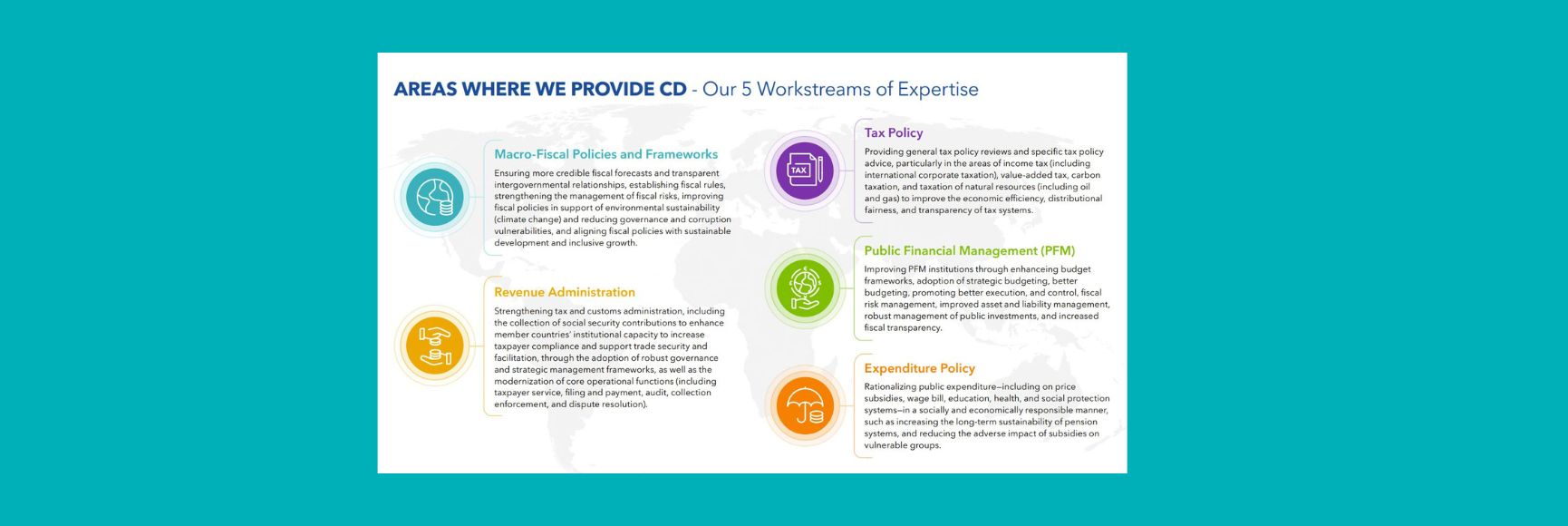Posted by Duncan Cleary[1]
The IMF’s senior management recognizes the potential value of Big Data and Analytics[2] for its work. In late 2015, the IMF hosted a symposium on Big Data, and following this event the Managing Director, Christine Lagarde, sponsored the Big Data Innovation Challenge, where she urged staff to ‘step out of your comfort zone and propose bold new ideas’. The challenge saw 109 entries from across 16 departments. There were ten finalists chosen by a panel of internal and external experts. Of these finalists, six were awarded seed money. A proposal from the IMF’s Fiscal Affairs Department (FAD) was placed fifth, with the title ‘Applying Analytics for Better Tax and Customs Administration’. This proposal laid out in broad terms how applying analytics can assist tax and customs administrations in improving their performance across a range of business areas, but with a focus on risk management.
FAD, through its Revenue Administration Divisions, provides technical assistance to many countries on a regular basis. The objective is for these countries to achieve systems of tax and customs administration that are sustainable, fair, and efficient. How can making better use of available data assist in achieving this goal, and what role can FAD play? The proposal from the Big Data Innovation Challenge seeks to develop a methodology that combines both in-country field work and headquarters-based analysis of micro-level tax and customs data. Tax and customs administrations are often holders of large quantities of micro level data, their ‘Big Data’, at the taxpayer/ trader level, and at the transactional level.
What does the term ‘Big Data’ actually mean? There is no single agreed definition, but in today’s world, the volume, variety and velocity of data creation has recently exploded, and tax and customs administrations are part of that story. Examples of these data include registration details, tax returns, payments, debt management, intervention results (e.g., audit) and service channel data. Harnessing the use of Big Data analytics brings challenges but also great opportunities. The broad objective of the Big Data initiative is to leverage the power of analytics to improve the efficiency and effectiveness of tax and customs administration, with a particular emphasis on developing capacity within organizations to extract value from their data.
The benefits of the initiative are numerous. They include better use of data in tax and customs administration, the development of methodologies that can be shared across administrations in different countries, and a framework for improving data quality and analysis that supports performance measurement through tools such as the International Survey on Revenue Administration (ISORA) and the Tax Administration Diagnostic Assessment Tool (TADAT). The initiative also creates opportunities for collaboration with other international institutions, as well as raising the profile of FAD as an advocate for using Big Data and analytics through its technical assistance and research activities.
The benefits of the initiative can be seen at a number of levels: strategic, tactical and operational. At the strategic level, over the medium- to long-term, the initiative aims to develop the capacity of countries’ tax and customs administrations in the use of analytics to improve their performance. At the tactical level, the initiative should lead to measurable benefits such as improved data quality, more efficient case selection for audits and other interventions, reduced levels of debt and arrears, and better services to taxpayers and other stakeholders.
Initially the focus will be on an operational level target, namely how analytics can be used in some “proof of value” exercises to address specific risks that are common to many tax administrations. These risks include VAT refund fraud, identity theft, illicit trade, and tax evasion. A wide range of analytical methods[3] could be used to address these types of risk.
The “proof of value” aspect of this proposal is now in preparation. Countries that are considered suitable for the work will be selected on a range of criteria including expert input from the management and staff of FAD, the availability of data and resources in the country’s tax and customs administration, and senior sponsorship by the administration. Shortlisted countries could then be invited to participate in testing the proposal’s “proof of value”.
For further information, see https://imf.brightidea.com/bigdata or contact Duncan Cleary, FAD (R2), dcleary@imf.org.
[1] Technical Assistance Advisor, Revenue Administration 2 Division, Fiscal Affairs Department, IMF.
[2] http://en.wikipedia.org/wiki/Analytics and https://en.wikipedia.org/wiki/Big_data.
[3] For example, data quality for analytics; data preparation for analytics; data visualization; exploratory analysis at the univariate, bivariate and multivariate level; cluster analyses; principal components analysis; factor analysis; network analyses; and spatial analyses/ GIS (Geographic Information Systems).
Note: The posts on the IMF PFM Blog should not be reported as representing the views of the IMF. The views expressed are those of the authors and do not necessarily represent those of the IMF or IMF policy.






